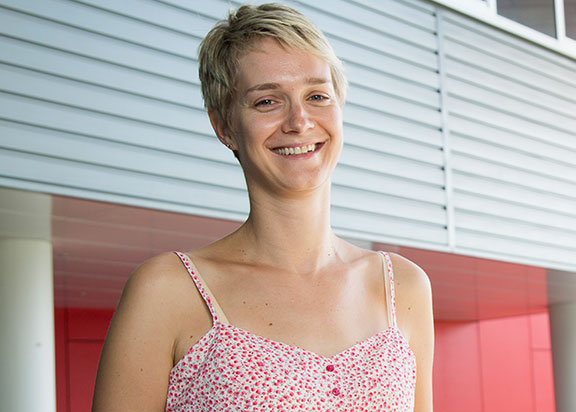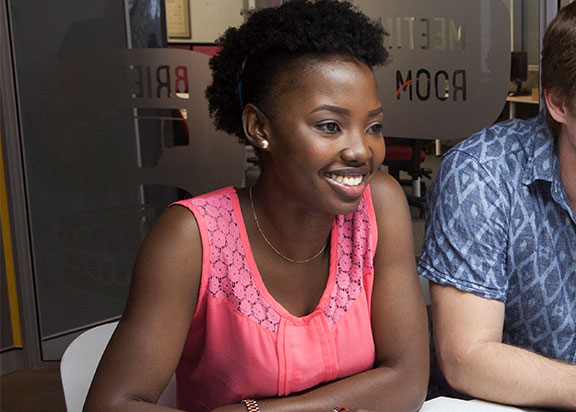Visual arts
Make an impact and turn your creative passions into a rewarding career
At Griffith, you’ll join a community of likeminded visual artists of every discipline. Through a combination of theory and hands-on studio practice, you’ll explore diverse styles, mediums, techniques and concepts, from drawing and painting to sculpture and Contemporary Australian Indigenous Art.
Under the guidance of experienced industry professionals, you’ll cultivate your own unique vision and voice, as you experiment, push boundaries and develop the skills you’ll need to forge your own path.
Our curriculum has a strong emphasis on cultural sensitivity, ethical practice and engagement. As you explore the intersection between art, technology and community, you’ll even have the opportunity to exhibit your own works to other students, staff and the general public. Our strong industry links will also ensure you gain practical, job-ready skills, ensuring you graduate ready to find your place in the world, whether that’s in a studio or a corporate office.
Why choose Griffith?
Showcase your potential with the option to apply via portfolio admission.
Exhibit your work to staff, students and the public at industry events.
Find your home at Griffith's Queensland College of Art and Design.
Study in world-class facilities, including art galleries, exhibition spaces, studios and cutting-edge computer labs.
See the studios you'll learn in
Experience hands-on learning in state-of-the-art studios. At Queensland College of Art and Design, you'll work in innovative, purpose-built studios and galleries. These dynamic environments foster collaboration and critique, providing a shared space where students, staff, and visiting artists can exchange ideas and grow creatively.

Frequently asked questions
Have questions about study? We've got all the answers.
Top topics
At Griffith, our academic year is broken up into three parts—called trimesters. Each trimester includes a 12-week teaching period, a study week and an exam period.
Breaking the year into three trimesters, instead of two semesters, offers students increased study load flexibility, additional opportunities to participate in placements and industry engagement, and. for some programs, the choice to accelerate their degrees and graduate sooner.
While you may not be required to study in all three trimesters, minimum study loads are still necessary to meet Centrelink and Department of Home Affairs requirements. For most domestic and international students, Trimester 1 and 2 are compulsory while Trimester 3 is optional.
A degree is the overall program of study you’re enrolled in, such as a Bachelor of Science. Within your degree, you’ll have to complete a certain number of units of study to graduate, and these are called courses or subjects. While your degree will be relatively broad, courses are much more specific to a certain topic and allow you to tailor your degree to suit your goals. For example, within a Bachelor of Science, you will be able to choose from a range of subjects each trimester, such as mathematics, physics, chemistry and biology.
Whether you choose to enrol in an undergraduate or postgraduate degree will depend on your career goals, previous education and professional experience.
If you're just finishing high school or you haven't attended university before, an undergraduate degree is a natural first step. You'll receive a strong foundation in your chosen area, have the opportunity to explore a range of different subjects, and develop the skills you'll need to find success in study.
If you already have an undergraduate degree, or you have extensive professional experience in a particular area, a postgraduate degree may be the right choice for you. Postgraduate degrees will generally provide more specialised course content and more opportunities to engage in your own research.
Lectures, sometimes called seminars, are formal presentations conducted by your lecturer or another teacher. At Griffith, many of our lectures are recorded ahead of time and are available online.
Tutorials are smaller classes that allow discussion of lecture content and assignments. You can ask questions and clarify concepts in a less formal environment.
Workshops usually involve academic staff presenting themes or concepts related to the course. They also often include hands-on learning to facilitate discussion around the topic.
Tutorials and workshops are sometimes collectively called contact hours.
When you study at university, you will likely have to choose one or more majors for your degree. Majors are the primary focus of your degree, and add an extra level of specialisation. For example, as part of your Bachelor of Science, you might choose to major in chemistry, biology, or even both. In many cases, completing at least one major will be a requirement for you to graduate. This means you'll need to take a certain number of courses in that area.
Minors are secondary fields of study, generally chosen to complement a major, and usually require fewer courses to complete. Minors allow you to gain additional skills and knowledge in an area, either for your own interest or to support your career aspirations. For example, as part of a Bachelor of Business, you could minor in a foreign language.
While the decision on what to study is ultimately up to you, there are plenty of helpful resources available to guide you through your options.
Our study guides and degree search are both a great place to start, and include information about all of our degrees and how you can apply for them. You can also chat with us online for more assistance, call us on +61 7 373 56425 or submit an enquiry and one of our team members will be in touch with you soon.
While the decision on what to study is ultimately up to you, there are plenty of helpful resources available to guide you through your options.
Our study guides and degree search are both a great place to start, and include information about all of our degrees and how you can apply for them. You can also chat with us online for more assistance, call us on 1800 677 728, or book a 30-minute Q&A session with one of our advisers at a time that suits you.
There are plenty of things you can do and support services you can access to set yourself up for success at university.
One of the most important thing you can do is learn to manage your time well. With all your free time between lectures and tutorials, it's key to set the right balance between work and play, so you can make the most of both.
Speaking of play, Griffith is home to more than 120 clubs and societies, ranging from educational, professional and political to sporting, social and cultural. Making friends at university can feel hard at first, as you will often have classes with different people, so make sure to check some out and connect with like-minded peers to share your study journey.
If you need extra support at university, we also offer a range of services to help. Our staff are available online, in-person and over the phone, and can assist you with everything from study skills, assignment writing and IT support to career advice, health and wellbeing, finance, and equity and diversity.
Transitioning from high school to university can be challenging for some students for a range of reasons. It's a new environment with different people, expectations and methods of teaching and assessment, so it's fair to expect to go through an adjustment period. But, if you're a little nervous about making the jump, there are some key things you can keep in mind to make things smoother.
University comes with a set of increased academic expectations, both in terms of the the volume and complexity of the course content and the level of independence and time management required. This means that as well as having to more study and deeper research to get to grips with the material, you'll also be responsible for managing that workload yourself. It's important to set aside time to study, particularly with all the other new demands on your time.
You'll also be exposed to a much wider range of people—both students and staff. Unlike at high school where class sizes are relatively small, your first-year lectures, which are normally shared across a number of degrees, may have as many people as your entire high school grade. You’ll also have access to a wide range of societies, clubs and other extracurricular activities. That means there’s many more opportunities to find like-minded friends and expand your social circle.
As a general rule, you should expect to put in around 10-12 hours a week per subject, including your lectures and tutorials.
That said, how much you need to study will depend on a range of different factors—such as your degree, course load and learning style. If you're taking courses with unfamiliar or challenging content, you may need to study more. On the other hand, if you're studying a subject you're already confident in, you may need to do less.
The amount of time you spend studying may also vary throughout the trimester. At the start of the trimester, when you're being introduced to the course's foundational material, you may find you need to study less to keep up. But, when exams and assignments roll around, you could need to put in extra hours to stay on top of things.
We have a great range of accommodation options for you to choose from, depending on what you need and your budget. You have the choice of staying on campus, off campus or in a homestay. Find out more on our where to live page.
At Griffith, we understand how important flexibility is to our students. That's why, for almost all of our degrees, you can choose to study online, on campus or a blend of both. As long as your course requirements allow it, you'll be able to swap freely between both methods of learning.
If you're not sure that your current degree is for you, it's a good idea to have a chat with your course coordinator or one of our friendly study advisers.
If you do decide that you'd like to change degrees, it's generally a relatively simple process. Depending on your current degree and the degree you'd like to transfer into, you may even be eligible for credit for the subjects you've already completed. You can find more information about the process on our internal transfers page.
You will need to meet both academic and English language entry requirements. Check the 'How to Apply' section of your chosen degree to view the requirements.
A Commonwealth supported place is a place at university or another higher education institution where the Commonwealth Government pays a portion of your fees. This makes university education more affordable and accessible.
Generally, if you’re studying an undergraduate degree, you’ll be doing so as a Commonwealth supported student. If you’re studying a postgraduate degree, whether you receive a Commonwealth supported place will depend on your circumstances and what you’re studying.
You can find out if there are Commonwealth supported places for any particular degree by referring to the degree page.
Yes! Depending on what you’ve studied previously and what you want to study now, you may be eligible for credit, which can reduce the time and cost of your degree. Generally, it will not matter if this study was undertaken at Griffith or at another institution. If you have significant professional or other relevant experience, you may also be eligible for credit for that as well.
You can find out more about how to apply to have previous study or experience recognised on our credit transfer page. You will also be able to see what sort of decisions have been made previously, so you can have a better idea of what to expect if you apply.
Making friends at university can be a little different to making friends at high school. For a start, instead of being with the same group of people every day, you might only see particular classmates once or twice a week—and only for a few hours. But that doesn’t mean there aren’t plenty of great opportunities to find new friends.
At university, you’ll get to meet a much more diverse range of people from varying cultures, backgrounds and age groups. And at Griffith, you’ll also have access to a wide range of clubs, societies and social activities. That means it’s much easier to find likeminded peers to connect with, whatever you’re interested in. Put yourself out there, and you’re sure to find your people.
Absolutely! Griffith is proudly committed to creating a safe and welcoming environment for all of our students and staff. As well as on-campus security and CCTV, we offer a range of services to ensure you feel safe and supported while you're studying with us. That includes counselling and wellbeing support and a 24-hour, 7-days-a-week crisis hotline.
If you have worries about your safety on campus, or if you'd like to confidentially disclose concerning, threatening or inappropriate behaviour, our Student Safety and Wellbeing team are always available.
Depending on what you're studying, most of your lecture content will be available online for you to watch at a time that suits you. You may be required to attend campus or other locations for in-person activities, such as practical learning opportunities and work placements. But don’t worry, we always make it clear on a subject page if on-campus attendance is needed.
At Griffith, we believe that everyone's experiences and talents are valuable, and we're committed to ensuring equal access to education for anyone who wants to learn.
We offer a wide range of scholarships to relieve some of the cost pressures of studying. Whether you're a high-achiever in class or on the sporting field, have experienced educational disadvantage or hardship, or need help with relocating for study, there's a scholarship to support your goals.
To find out more about our scholarships and how to apply for them, take a look at our scholarships and awards page.
International students must ensure they understand the work limitation conditions of their student visa.
You certainly can. Our degrees are designed with maximum flexibility in mind, so it's more straightforward to balance competing requirements, such as work and study.
The minimum requirements for each degree are generally based off last year's intake. That means that requirements can vary from year to year, depending on degree popularity. it also means that if a degree has not been offered in previous years, it may not have a published ATAR requirement.
To apply, you will need to provide the following documents, translated into English if appropriate:
- a certified copy of your academic transcript
- a certified copy of your English test results (if available)
- a copy of your current valid passport or official photo identification
- if you are applying for degrees in animation, games, film, music or visual arts, you may need to submit a portfolio of work or audition
If you have not yet received your final results, you can still apply. Please include the name of your qualification and the date your results will be available.
If you'd like to temporarily withdraw or take a break from your studies, that's generally not an issue. The process will differ slightly depending on if you're already studying at Griffith and you'd like to take a leave of absence, or if you've yet to start studying and would like to defer commencing your degree. For more information about the process, check out our page about taking a break from study.
Depending on how you applied to study at Griffith, there are a few different ways you can check your application status.
If you applied via QTAC or UAC, you'll generally have to wait for each offer round to see if you have been accepted. Make sure to log into the QTAC or UAC portal to ensure you've submitted all necessary documentation.
If you applied directly to Griffith, generally as an international or postgraduate student, you can check the current status of your application using the relevant portal.







